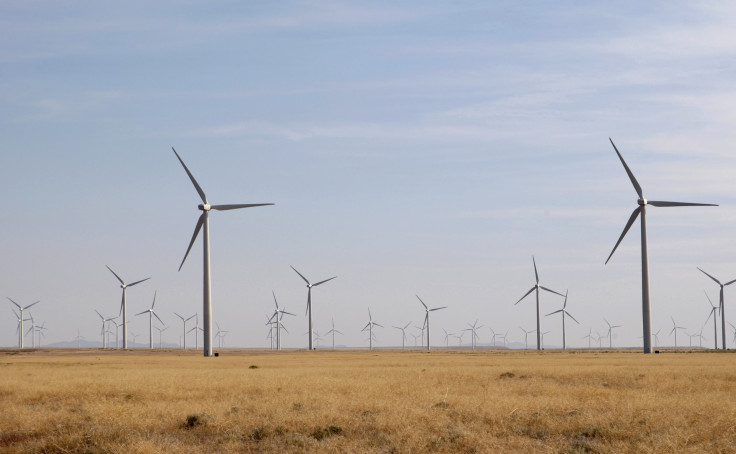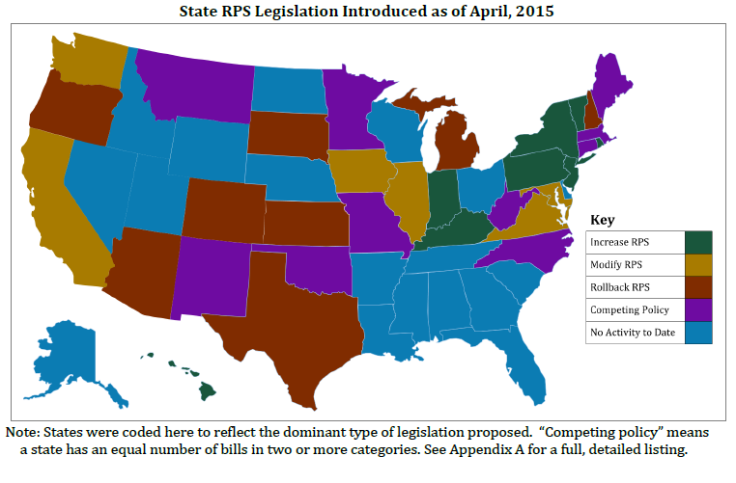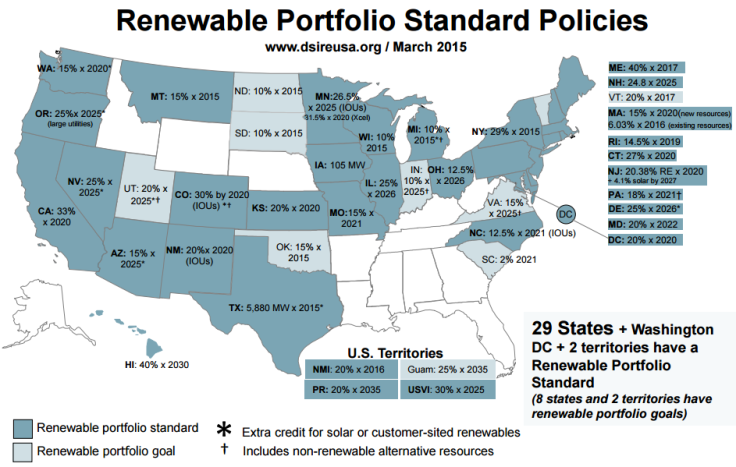Renewable Energy: Kansas Gov Brownback Pushes Plan To Weaken State Mandate; Texas, North Carolina Advance Similar Bills

A Republican-led effort to dismantle state renewable-energy laws is poised to score another win this spring. Kansas Gov. Sam Brownback this week unveiled a plan to weaken a state mandate requiring utilities to get one-fifth of their power from wind, solar or other clean-power sources by 2020. Billed as a compromise, the proposal would turn the mandate into a voluntary goal.
Brownback’s proposal came after years of attempts by business coalitions and conservative policy groups to repeal the renewable portfolio standard (RPS) in Kansas and other states. Critics say the laws unfairly favor renewable-energy projects over traditional sources of energy, including coal and natural gas, and inject too much government influence into the country’s energy sector.
About 30 states have RPS laws, which are largely credited with growing the nation’s wind- and solar-power capacity and spurring the interest of private investors. Proponents of such measures say weakening or repealing the rules would hamper future clean-energy growth in individual states.
In the past few years, opponents across the country have launched almost 90 initiatives to eliminate or water down RPS targets. Americans for Prosperity and the American Legislative Exchange Council, both groups with ties to foundations run by billionaire corporate executives Charles Koch and David H. Koch, have spearheaded efforts in various states, including Kansas.

Most of the anti-RPS measures have failed, although a handful have succeeded or are still advancing. Ohio last year became the first state to freeze its renewable energy and energy efficiency requirements after Republican Gov. John Kasich signed a rollback bill. In January, Democratic Gov. Earl Ray Tomblin signed a West Virginia law repealing the state’s RPS mandate that utilities get one-quarter of their power from so-called clean-coal or renewable sources by 2025.
In North Carolina, legislators are pushing a plan to freeze the state’s RPS requirements at their current levels. Under the original law, utilities are required to get 6 percent of sales from renewables now, and 12.5 percent of sales by 2021. Senators in Texas are seeking to eliminate the state’s renewables law, which could hinder investments in long-distance transmission lines to connect wind turbines in West Texas to urban centers in the eastern part of the state.
In contrast, legislators in other states are pushing to strengthen state renewables mandates, especially as target deadlines approach in the next few years. In California, Gov. Jerry Brown, a Democrat, is pushing to boost the state’s RPS from 33 percent to 50 percent by 2030.
“States that have an RPS signal that they’re open to renewable energy and they want that kind of economic development in their state,” said Ben Inskeep, a policy analyst at the North Carolina Clean Energy Technology Center in Raleigh. “States that are targeting them, or freezing them, might be sending a different message.”

Brownback framed his RPS proposal as an agreement between free-market groups and the wind-energy industry. In recent weeks, representatives of Americans for Prosperity, the conservative-leaning Kansas Chamber of Commerce and the Wind Coalition, a trade group, met with state lawmakers to work out the deal. The bill is now headed to the floor of the Kansas House of Representatives.
The Kansas proposal would turn the state’s mandatory renewables requirements into a voluntary goal after 2016. It would also limit property-tax breaks for new wind farms, although newer projects would be taxed as commercial properties, rather than utilities, which gives developers lower tax rates. Kansas also won’t impose a 4.3 percent excise tax on wind-energy production, a policy that lawmakers were considering.
Brownback pointed out wind-energy production in Kansas has nearly tripled during the past five years, and he said the state’s utilities are on track to hit the 20 percent renewables target four years ahead of schedule. The state’s 3,000 megawatts in wind-power capacity has led to 12,000 jobs and drew $8 million in investment, according to the Wind Coalition.
“It’s been fabulous growth. It’s been a tremendous investment in the state of Kansas in renewable energy,” Brownback told reporters at a Monday news conference. The agreement “further solidifies and stabilizes the policy environment, so that investment can continue in Kansas.”
Environmental groups, excluded from the negotiations, criticized Brownback’s plan and said it would slow wind development in the state. “Our state is riding the brakes while other states are hitting the gas pedal. Nebraska, Oklahoma, Iowa ... They’re going to have a competitive edge,” Zack Pistoria, a representative of the Kansas Sierra Club, told the Wichita Eagle newspaper. “Now’s the time to double down on renewable energy, not double back.”
The North Carolina Clean Energy Technology Center’s Inskeep said that, given the pace of wind development in Kansas, the state is still likely to meet its renewable-energy goals under the weaker RPS. But he said that preserving the mandatory requirement could help Kansas in coming years, particularly should the Obama administration adopt its Clean Power Plan. The federal proposal seeks to slash carbon-dioxide emissions from power plants to 30 percent below 2005 levels by 2030.
“Having an RPS in place, or a framework like that, could help if those [federal] rules do get implemented and the state has to adapt by reducing carbon emissions and accelerating renewable-energy development,” Inskeep said.
© Copyright IBTimes 2024. All rights reserved.





















